Tag: Gabrielle Bianco ’21
First Ladies Change America
by The Cowl Editor on April 26, 2018
Opinion

The nation found itself in a state of mourning on Tuesday, April 17. Former First Lady Barbara Bush passed away after battling Chronic Obstructive Pulmonary Disease (COPD) and congestive heart failure. As wife of former President George H.W. Bush and the mother of former President George W. Bush, she was remembered by both politicians and civilians alike for being a bold, down to earth, and elegant first lady. She was an advocate for public service and was particularly devoted to the causes of children’s literacy and the AIDS epidemic. The outpouring of condolences from people around the world speak not only to Bush’s character and role in American society, but also to the impact of former first ladies on America.
While there has unfortunately never been a female president, the office of first lady has served as a platform for strong women to elicit change. Over the course of 45 presidencies, the office of first lady has changed drastically, with women taking on a more political and socially active role. Barbara Bush served as a perfect example of this evolution. Her commitment to charitable causes proved to be so central to her legacy that she was often called, “The First Lady of Literacy.” Not only did she advocate for the cause as it related to civilian organizations, but she also played an integral role in the passage of the National Literacy Act of 1991.
She was a champion for many of those who were at risk in America. During the height of the AIDS epidemic in the 1980s, Bush advocated for those struggling with the disease and tried to expel prejudices and stigmas that were associated with its presumed spread through human interaction. At her funeral, she was lauded by the musician Bono for her work and for influencing her son, the 43rd president, to continue the fight against AIDS in Africa.
While the role of president is typically wrapped up in political controversy, first ladies are often able to connect with the American public and nations around the world in a way that is less politically charged but still just as important for enacting social change. A former secret service agent who worked with the Bush administration recently said in an article for CNN that Barbara Bush’s code name “tranquility” was a perfect choice given her calm demeanor and ability to connect with people.
Three former first ladies and current first lady Melania Trump attended Barbara Bush’s funeral service. Their presence, as well as their actions while they were in office, can be seen as a testament to a continuation of first ladies serving their country just as Bush did. Most recently, Michelle Obama left a legacy of incredible service and inspiration. Her advocacy focused on nutrition as well as women’s rights and empowerment, spearheading causes such as Let Girls Learn. During her time in office, Obama also proved to be an accessible first lady, being very active in the media and being a guest on a number of talk shows such as The Ellen DeGeneres Show and Late Night with Jimmy Fallon.
What was once a role limited to the domestic sphere, the title of first lady has evolved to mean so much more than simply wife to the president. Barbara Bush serves as perfect example of this. Her impact on the American public not only through her advocacy for AIDS and literacy, but also through her graceful disposition and the example she set for other first ladies, has left a mark on the United States that can never be erased.
Tangents and Tirades
by The Cowl Editor on April 12, 2018
Opinion

Don’t Judge a Book by Its Cover
To some, the phrase “Human Library” might sound more like something out of Beauty and the Beast than an event held at Providence College. Images of fantasy aside, the Human Library is an annual event hosted by Students for Social Action that took place this past Sunday. The Human Library is an international organization committed to breaking down barriers and dismantling stereotypes through the sharing of stories.
At Human Library events, participants can listen to stories from human “books,” or volunteers, who wish to share their unique life experiences. Volunteers at PC’s event represented a diverse range of experiences such as, what it is like to grow up with deaf parents, working in the healthcare field, being a first generation American and college student, and living with a brain injury.
The mission of Human Library is incredibly important. In a time where communication through technology is the norm and people appear to capitalize on differences, the opportunity to speak face to face with someone with a different perspective can be invaluable. The event promotes empathy and tolerance in a way that cannot be replicated on social media or even in a real book. As PC strives to create a more inclusive community on campus and educate tomorrow’s leaders, events like Human Library can prove to be a true asset.
-Gabrielle Bianco ’21
Friar Students Already Give
This past week, the Providence College community came together for the 24-hour giving event, #FriarsGive, in the hopes of reaching a goal of 3,989 donors for each of the 3,989 PC students. Parents, PC athletics supporters, Friars of the last decade, PC alumni, as well as current students were all challenged to donate and participate in spreading the word of the event through social media.
While no one can deny the importance of charitable donations to support PC’s mission and its students, should students really be asked to make donations on top of the annually increasing rates of tuition and room and board paid every semester? Although the #FriarsGive website states, “Your participation as a PC student, not the amount of your gift, matters,” the various campus-based events, as well as the food and prize giveaways directed towards students definitely place at the least some sort of expectation on the part of the student body to make a gift towards the school.
While we cannot deny the reality of PC as being a tuition-driven educational institution, we can focus the efforts of #FriarsGive towards the charitable donations of members of the PC community who already graduated. What kind of financial position are college students in to make any more of a donation than what is already required of them to attend PC in the first place?
Instead of celebrating the number of student donations made during #FriarsGive Day, why don’t we instead take a moment to recognize the growing number of PC students who will be in mounting debt by the time they graduate? It’s time to shift the focus of #FriarsGive donation efforts away from PC students.
-Sarah Kelley ’18
More Mental Health Awareness
Last Wednesday National Alliance on Mental Illness (NAMI) sponsored an event called “Inside Mental Illness.” The discussion itself was enlightening and humbling as members of the community shared their struggles with depression, anxiety, and schizophrenia.
However, it was disappointing to see that not every single chair in the Fiondella Great Room was occupied. Providence College holds these events for students to attend, and it is troubling and saddening to see how few college students take actual advantage of all of the resources the campus provides. In fact, these events allow for students to recognize mental illness symptoms in not only themselves but also in their roommates and close friends.
If more students attended these events they might learn that certain behaviors —like sleeping too often or drinking too much—may be signs of something more serious. Campus events like these are important because mental illness is prominent in society and it is not going anywhere.
According to a spring 2015 report by the American College Health Association, two-thirds of students who are struggling do not seek treatment. One in four adults experience mental illness in a given year. That can be you, your roommate, your significant other, or anyone. It’s important for students to attend these events so that they can bring awareness to themselves and to those around them. The stigma needs to end!
-Laura Arrango ’20
The Oscars Join In By Saying #MeToo
by The Cowl Editor on March 15, 2018
Opinion

by Gabrielle Bianco ’21
In recent years, the Academy Awards, also known as the Oscars, has taken a turn toward the political, with movements such as #OscarsSoWhite causing the event to be not only a source of entertainment, but a rallying cry for social justice and change. This year at the 90th Academy Awards held on March 4, the #MeToo and Time’s Up movements took center stage, taking a stand against sexual abuse and harassment in the work place.
Though the political atmosphere was nothing new, there seemed to have been a tonal shift from past events. This most likely comes as result of the fact that these movements cut right to the heart of Hollywood.
While the Academy Awards are meant to be a celebration of the best work in film throughout the year, there was no way of avoiding the elephant in the room. Several careers were destroyed as allegations of sexual assault and harassment came to light in reference to stars such as Harvey Weinstein, Kevin Spacey, and Dustin Hoffman. The reiteration of these movements’ ideas at this year’s Academy Awards was important to keep the movements alive and continue the call for change.
The effects of these movements were felt in the months leading up to the awards show. Prior to the start of the awards season, Harvey Weinstein was expelled from the Academy of Motion Pictures Arts and Sciences. Weinstein is only the second person to ever be expelled, following actor Carmine Caridi, who was banned for sharing movie screeners. The name Harvey Weinstein had become almost synonymous with success in film. His name has been mentioned more than anyone else’s in past years’ acceptance speeches, and this year his name was noticeably absent.
The Academy’s decision to take such strict action against the media mogul shows that sexual abuse will no longer be swept under the rug or tolerated in Hollywood. While there was no mention of Weinstein in acceptance speeches this year, winners such as Frances McDormand chose to speak about the importance of women and equality in Hollywood.
The red carpet this year was also marked by controversy. Television host and producer Ryan Seacrest was accused by a former stylist of subjecting her to years of sexual harassment. While Seacrest emphatically denies the claim and an investigation performed by E! News indicated that he was not at fault, there was significant fallout on the red carpet. Seacrest’s red-carpet coverage lost 34 percent of its viewers from the previous year. There was speculation leading up to the red carpet that many actresses would refuse to be interviewed by Seacrest. While many actresses did stop to speak with him, it was noted that the attention paid to Seacrest was less than in years prior.
The ceremony itself was altered in response to the #MeToo movement. Traditionally, the awards for Best Actress in a Leading Role and Best Actor in a Leading Role are presented by the year’s previous winner in the opposite category. Based on this precedent, Casey Affleck was due to present the Award for Best Actress. However, following backlash from his win last year as a result of his past sexual misconduct allegations and in light of the Time’s Up and #MeToo movements, Affleck pulled out of presenting. He cited not wanting to take attention away from the lauded female performances as his reasoning.
The Academy Awards this year proved to be the culmination of a season stoked in controversy. Actions taken against sexual abuse and harassment in Hollywood sparked movements across the country and in many fields of work. “Time’s up” on these issues being suppressed or ignored.
After seeing the difference that even just one year can make, it causes one to think about what the dynamics of next year’s Academy Awards will be like. As the movement continues it is in the hopes that its message will be shared truthfully and genuinely, and that people, such as those in Hollywood, will not allow it to lose momentum.
Legislation Is Not Enough
by The Cowl Editor on March 1, 2018
Opinion
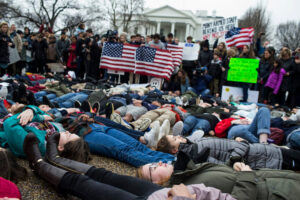
by Gabrielle Bianco ’21
Opinion Staff
On Feb. 14, tragedy struck in the United States. Again. Armed gunman Nikolas Cruz opened fire in Marjory Stoneman Douglas High School in Parkland, Florida. 17 people were killed including two faculty members. This horrific event is the latest one in an epidemic of gun violence in our country. In the wake of the incident, surviving students from Marjory Stoneman Douglas High School as well as citizens across the country have made impassioned pleas for gun control through legislation.
Unfortunately, despite a concerning trend in mass shootings in the U.S. becoming increasingly prevalent, little legislative reform has taken place. As the fight rages on for common sense gun reform, there are other avenues that Americans can take to combat the culture of violence that plagues the nation.
Following the recent shooting in Florida, teachers have been phenomenal advocates for change. In reaction to President Trump vocalizing his belief that educators should be armed in classrooms, teachers from around the country have responded with the #ArmMeWith campaign, in which they have expressed alternatives that will help eliminate violence, not perpetuate it.
Chris Peck, a high school English teacher from Utah, posted on social media that he wishes to be armed with “the resources and funding to help students in crisis and smaller class sizes so I can better know my students.” Brittany Wheaton, who also teaches English in Utah, posted in favor of being armed with “the resources & funding needed to help students experiencing mental health issues.”
This increase in resources and devotion to human interaction would prove invaluable. In many cases involving mass shootings, those who carry out the crime have displayed concerning behavior in the past or have a history of mental illness. By providing teachers and staff more opportunity to interact with students on a deeper level, there are more opportunities for teachers to see a student in crisis and provide them with the help they need before it is too late. Likewise, more resources through trained mental health specialists can be used to help students.
In an opinion piece for The Washington Post, statistician and former newswriter Leah Libresco went as far as to argue that approaches other than legislation are more effective in combatting gun violence. Legislation, she argues, can only go so far. After analyzing 33,000 gun related deaths, Libresco found that 2/3 of them are suicides.
Men between the ages of 15 to 34 are also at a great risk due to gang and street related violence. Domestic violence towards women also accounts for a large percentage of deaths. Libresco argues that more resources available to those contemplating suicide would be enormously beneficial.
Additionally, women in potentially dangerous relationships need to be given more attention in the criminal justice system in order to ensure their safety. Younger men at risk of street violence also need to be given resources such as mentors to help counsel them and deescalate conflicts.
The remarkable drop in violence in the city of Boston, known as the Boston Miracle, serves as a perfect example of the power of communication in reducing gun violence. In 1996, a program known as Operation Ceasefire promoted increased communication, assistance, law enforcement attention, and compassion. It was directed specifically at demographics prone to gun violence and resulted in a 63 percent reduction in monthly gun-related homicides in Boston. In the fight against gun violence, the most powerful tool can prove to be human interaction.
While people may debate as to how to decrease gun violence in the U.S., one thing is for sure: something needs to change. Since the legislative system has proven to be ineffective, energy must be put towards other avenues to stop violence as well. Many of these solutions can come as a result of civic action such as increasing communication in risk areas.
In such a turbulent time, students at Providence College, especially those entering the education field, have a unique opportunity to try to elicit change in whatever way they can. Lives are at stake and action needs to be taken
Meld Perspectives in the College Environment
by The Cowl Editor on February 8, 2018
Editorials
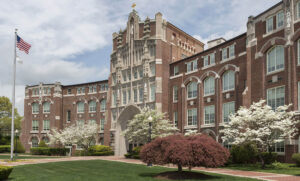
by Gabrielle Bianco ’21
Opinion Staff
Is college serving America’s needs? This question served as the prompt for two commentary pieces in the Providence Journal regarding the role of colleges today. The two pieces took contrasting views.
The first, written by Michael S. Roth, president of Wesleyan University argued that the college institutions are worth fighting for, as they provide students with the chance to be exposed to a variety of perspectives and educate students to impact the world around them.
The other article, written by Teresa Mull, a research fellow in education policy at The Heartland Institute, argued that colleges are becoming corrupt as they create a homogeny of liberal thought and pointed out the fact that while society stresses the need to go to college, it might not be the best option for everyone.
Students are left to contemplate where they fit into this debate. The answer is not black and white, but rather calls into question how knowledge is spread and the role of colleges in society.
The college years serve as a golden window of opportunity to be exposed to not only a wide variety of classes, but a variety of perspectives. For many students, going to college is the first time they have lived away from home and have the opportunity to live with and meet people they have not grown up with.
This melding of perspectives can be invaluable as students prepare to go out into a diverse and ever-changing world. Early exposure to different people can create a more sympathetic and accepting tomorrow. For this reason alone, colleges prove to be a worthy asset to society.
That being said, colleges have shown a trend in prioritizing liberal views. These partisan biases have been called into question as the animosity between political parties has heightened in recent years. According to Mull’s article, 58 percent of Republicans believe that colleges have a negative effect on the nation while 72 percent of Democrats believe the opposite. This divide is dangerous.
People involved at all levels of education must take action to ensure that dialogue is facilitated in ways in which people are free to speak out for what they believe without disparaging others with a different viewpoint.
In addition to raising questions about the imbalanced distribution of perspective in universities, the articles raise an interesting question regarding how society makes the college experience seem like the only option after high school graduation. While this notion may be widespread, it is far from true.
As Mull pointed out in her article, there are many instances in which a trade school or some other form of education may be a better course of action after graduating high school.
Likewise, the importance of learning through life experience must not be disregarded in favor of textbooks. A gap year before college is one way in which students can gain more experience about the world and themselves.
Jack Murphy ’20 decided to take a gap year before beginning his time at Providence College. He said, “Coming out of high school, I was pretty sheltered and unmotivated. I hadn’t gotten to know many people that weren’t like me, and I also had no idea what I wanted to do with my life. I ended up taking a gap year and spending nine months teaching in Paraguay…Taking time off from school was a really influential time for me to reconsider what was really important to me and how I want to live the rest of my life.”
Colleges are an integral part of society. The unique opportunity they have to merge and educate students from many backgrounds and educate is essential to progress.
However, colleges must check themselves to ensure that they are nurturing free inquiry to the best of their abilities. While colleges are of great importance, they are not the best option for every high school graduate and should not be considered the only course of action.
As the College enters its second century of education, it is essential that we stick to our mission of “academic excellence in pursuit of the truth, growth in virtue, and service of God and neighbor.”
Tangents and Tirades
by The Cowl Editor on February 2, 2018
Opinion
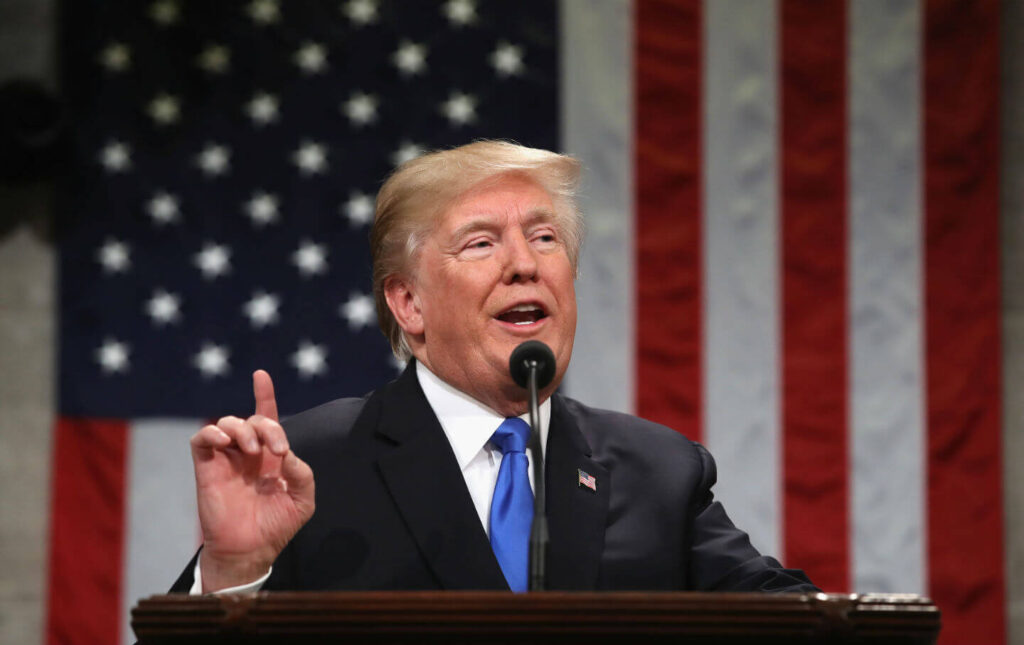
Trump: Think Before Speaking
During the 45th annual March for Life in Washington, D.C., President Trump completely misspoke before a crowd of pro-life advocates.
What began as a standard, run of the mill anti-abortion speech took a turn for the worse when Trump went careening far off script and said, “Right now, in a number of states, the laws allow a baby to be born from his or her mother’s womb in the ninth month. It is wrong, it has to change.” A woman standing behind him nodded in agreement.
Media outlets bubble wrapped the gaffe, claiming what Trump meant to say was that it is wrong for women to undergo third trimester abortions.
There is no doubt he meant to say something different, but this slip up is not an isolated incident for Trump, and reinforces the fact that he will speak utter nonsense without batting an eye.
Some people say that Trump is unfit to be president because he exhibits signs of one mental illness or another. This is an inappropriate and insufficient case against him.
President Trump is simply incompetent, stumbling from one hiccup to the next. And while misspeaking is forgivable, failing to correct oneself after this kind of mistake is not. This reveals something truly worrying: in President Trump’s eyes, he really is a “very stable genius” who can make no mistakes, no matter how obvious they may be.
-Lela Biggus ’18
Make PC Pet-Friendly
As the owner of two golden doodles, I have found that one of the hardest things about returning to campus after winter or summer break is leaving my pets behind. Coming across a dog on campus and getting those few minutes of playtime are the highlight of my week.
Although this is a treat, many animal-loving students could feel this happy all the time if Providence College were made a pet-friendly campus.
Certain universities have designated buildings where pets such as fish, cats, and small dogs can reside. Of course, this amenity comes with strict rules and regulations that the owner must follow.
However, more and more campuses are allowing animals to live on-campus. Starting next year, Johnson and Wales University will be piloting on-campus, pet-friendly communities in three different residence halls. Some of the rules include designated-areas, only allowing one pet, dogs no more than 40 pounds, only certain breeds allowed (i.e. no German Shepherds, Pitbulls, Akitas), and a minimum age of one year old.
Although not everyone is a pet-person, it is not fair to take away this possibility altogether for those who are. College is an opportunity for students to become independent; having your own pet would only promote this in college students.
In addition, we have seen how great animals are for morale, such as when the barnyard animals visit campus during times of stress (i.e. midterms and finals). If we had this kind of companionship full-time, it could decrease stress levels overall. Ultimately, pets could help improve students’ mental health on-campus at the College.
-McKenzie Tavella ’18
More Diversity in Hollywood
The 2018 Oscar nominees prove to be a step in the right direction for representation in Hollywood.
The nominees were more diverse in nature with Greta Gerwig becoming the fifth woman to be nominated for Best Director and Jordan Peele becoming the fifth black director to be nominated for the same prize. Rachel Morrison is also the first woman to be nominated for Best Cinematographer for her work in Mudbound.
Amid an award season steeped in controversy, the nominees show signs of progress. Today, it can sometimes seem as though people are more divided than they are connected. The representation of more perspectives in the media, however, can prove to be therapeutic. As new voices are introduced, an opportunity is created to increase communication and empathy among all people through the sharing of art.
There is still room for improvement. While Guillermo del Toro, a Mexican director, received a nod in his category, there are still few Latino and Hispanic nominees. Likewise, Pakistani writer and actor Kumail Nanjiani received a nomination for his screenplay, The Big Sick, but there is still a need for more Asian voices to be heard. As the film industry changes, it will be exciting to see more voices being shared.
-Gabrielle Bianco ’21
PC Students March For the Future
by The Cowl Editor on January 25, 2018
Campus
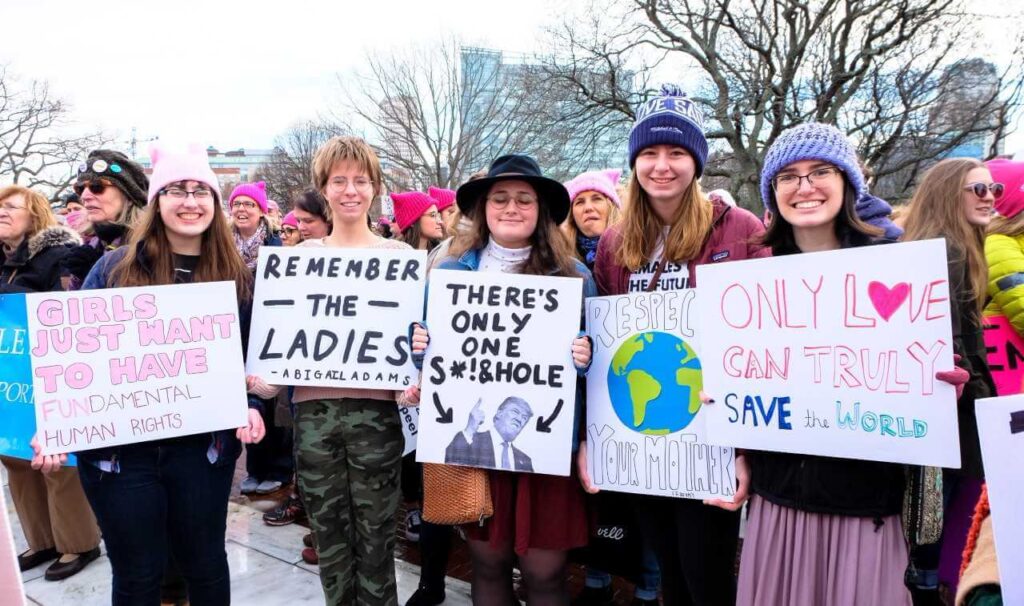
by Gabrielle Bianco ’21
Opinion Staff
“Time’s Up.” “Liberty and Justice for All.” “Resist.” Slogans such as these were emblazoned on signs at the Rhode Island Women’s March, held on Saturday, January 20, 2018 at the Rhode Island State House. Thousands were in attendance in response to actions by the government and current president which are threatening to the rights of women, minorities, immigrants, and the LGBTQ+ community. In a time in which people are frustrated by the measures taken by the government, it is up to civilians to be instruments of change in their communities.
While a number of activists from different backgrounds spoke at the march, no politicians took to the podium. The decision to not have any politicians speak lent itself well to the purpose of the march, which was to focus on civilian social justice rather than politics.
Each of the speakers discussed a unique issue concerning social justice that plagues our country today and described how they are working to make a positive change.
Civic engagement is vital to any democracy. The 2016 election season was marred by strife and frustration coming from many Americans who felt that the bureaucracy and the “big business” politics of the government had left them in the dust. The government, however, only has so much influence in the day to day activities of civilians, so it is up to citizens to elicit change.
The scope of service and social justice is so wide that anyone can find a cause to support using their own skills. Actions such as voting, volunteering, supporting local businesses, protesting, and even running for office are just a few examples of courses of action people can take to make a difference. While it might seem easier to be patriotic in a time when people are proud of their government, true patriotism comes from engaging in civic duty and working to better the nation where there is room for improvement.
If history can serve as a map of sorts for where the country has been and where it can go, then the recent social justice movements prove to be promising for the future. Throughout history, change has occurred not as the result of the actions of one person in the executive branch, but rather by groups of committed individuals whose actions create ripple effects throughout the nation. The road to progress is not easy by any means—there is still a lot of work to be done—but movements such as the Women’s March will hopefully lay a solid foundation for future advancements.
The Providence College community was well represented at the march, with many students attending and showing their support and passion for equality. The march comes at a fitting time for PC students, having just celebrated Rev. Dr. Martin Luther King, Jr. Convocation week. Just as Dr. King, Jr. served as a titan of social justice, a new generation of students and leaders is preparing to take the reins of the future. Dr. King, Jr.’s words were recited at the march: “The moral arc of the universe is long, but it bends towards justice.”
As we march forward into 2018, we must all take it upon ourselves to follow the moral arc of the universe, and stand up for what is right to ensure a more equal and just tomorrow.
Tangent & Tirades
by The Cowl Editor on December 7, 2017
Opinion
Take a Break: Watch A Capella
By the end of the semester, stress levels and workloads are especially high for students, professors, and faculty alike. Remembering to take a moment to relax and enjoy the holiday season is often difficult, but one end-of-the-semester event always seems to make it easier: Providence College’s very own A cappella show.
Not only did PC’s three A cappella groups deliver high-energy musical performances that could get any PC student singing and clapping along, but their diverse and unexpected set list really took the audience by storm.
First and foremost, PC’s all-male group, Special Guest, completely turned heads with their closing song. I do not think anyone in the crowd was expecting to hear a song from Moana that night, let alone a funky mash-up of “How Far I’ll Go” and “You’re Welcome,” and other songs performed with the spunk and passion that only a Disney soundtrack can evoke.
Strictly Speaking also came in hot with an attention-grabbing cover of one of Elton John’s classics, “Bennie and the Jets,” and no one could ignore the energy and pure clapping power of Anaclastic’s version of “Thunder” by Imagine Dragons.
Although the end-of-semester chaos has fallen upon PC, our A cappella groups’ performances remind us to always take a step back from the stress this time of year, sit down, unwind, and enjoy the talent our students have to offer through their unique and passionate performances.
-Sarah Kelley ’18
Photo Courtesy of Jeremy Selwyn – WPA Pool/Getty Images
Royal Engagement Shows Progress
Wedding bells are ringing in England. On Nov. 27, Prince Harry announced his engagement to Meghan Markle. After meeting on a blind date and dating for a year and a half, the couple is set to be married in spring 2018. This engagement proves to be unprecedented for a number of reasons. Markle, who starred in the drama series Suits, will be the first American in recent history, as well as the first person who identifies as biracial, to marry into the royal family. Markle’s mother is black and her father is white.
While this marriage will prove to be historic, there has been some backlash. In their first interview following the engagement, Markle described negative media regarding her race to be “disheartening.” In a statement, Prince Harry spoke out against such media coverage and denounced “the racial undertones of comment pieces; and the outright sexism and racism of social media trolls and web article comments.”
Despite these negative responses, the engagement has been largely praised. Many see the relationship as being representative of a more modern and progressive monarchy. In their post- engagement interview, both Prince Harry and his fiancée spoke of their plans to work for social justice. Prince Harry and Meghan Markle’s engagement should be celebrated not only because of the love they share, but for its potential effect on a more tolerant world.
-Gabrielle Bianco ’21
Muslims Are Not the Problem
When the leader of the country spreads messages about hate, what hope is there for everyone else? President Trump’s inflammatory retweets of anti-Muslim videos only enable those who harbor the same hatred for anyone who might be considered an outsider and wait for an opportunity to express it.
Throughout his campaign and presidency, Trump has proven to be particularly concerned with national security and the threat of terrorism. However, there is a definitive line between making border protection a high priority and condemning an entire group of people simply because they do not reside within those borders.
Instead of isolating terrorists as the real perpetrators, Trump suggests that a whole religion is at fault. By retweeting videos of a Muslim boy being violent against a boy with crutches, he endorses the views of a far-right and radical nationalist group.
Categorizing all Muslims together is unfair because it suggests that over one billion people worldwide are villainous solely because of their religion. Yet the same logic does not seem to apply nearly as much with perpetrators of any other religion.
Religion should not have to be the primary determinant of an individual’s character, nor should it be grounds for incriminating a consolidated group of people. Muslims are more than their religion, and the ones who pose a threat are in the minority.
-Hannah Paxton ’19
Raising Awareness For National Adoption Month
by The Cowl Editor on November 30, 2017
Opinion

by Gabrielle Bianco ’21
Opinion Staff
Saturday, November 18 was National Adoption Day. This day, which serves as the pinnacle of National Adoption Awareness month, was celebrated with adoptions across the country.
In Rhode Island alone, 23 adoptions with 17 different families were finalized through Providence Family Court. Some distinguished guests at the occasion were Governor Gina Raimondo and Dr. Trista Piccola, the director of the Department of Children, Youth, and Families.
While the purpose of National Adoption Day and National Adoption Awareness Month is to promote the adoption of children in the foster care system, the event received little recognition nationwide and was not covered at all by Rhode Island’s major newspaper, The Providence Journal.
The statistics regarding children in the foster care system in the United States paint a concerning picture. According to the most recent data reported in 2015 by the U.S. Department of Health and Human Services, 264,746 children entered the U.S. foster care system in 2014.
Of those children, 107,918 were awaiting adoption, with only 49,693 of them ultimately being adopted. In 2015, over 20,000 kids aged out of the foster care system without ever finding a permanent home. Why?
In considering the answer, I am reminded of a discussion that occurred several years ago while preparing for my Confirmation. Our class was discussing adoption as an option for an unplanned pregnancy when a classmate declared that all children who are adopted had “terrible lives.”
This statement shocked me not just for its sweeping negativity and ignorance but because my family was joyfully in the process of finalizing the adoption of my brother. He had joined our family as a foster child at one week old.
While I do not know where my classmate came up with his views, I do know that stereotypes are dangerous. The only way to combat them is through education, and the primary way to educate on this topic is through the media.
Just look at what it did for Breast Cancer Awareness month in October. Media coverage has successfully supported the promotion of the two main goals: to spread awareness of the need for early detection of breast cancer and to inspire hope for those affected by it. The month of October is crucial to this cause and countless lives have been saved because of it. Why has the ball been dropped in November?
National Adoption Month is a lifeline for the tens of thousands of children in our country looking for a home. We fail them when we remain silent, and we did just that this year.
Simple steps can be taken to increase awareness during November. Sharing stories of those who have experience with adoption can prove to not only educate, but inspire others to welcome a child in need into their hearts and homes. There are many statewide and national organizations that work to help the cause of adoption, but without proper media exposure, they do not always receive the support they need to succeed.
Increasing knowledge on the subject can not only positively change the narrative of adoption in this country, but change the lives of thousands of children.
Tangents and Tirades
by The Cowl Editor on November 16, 2017
Opinion
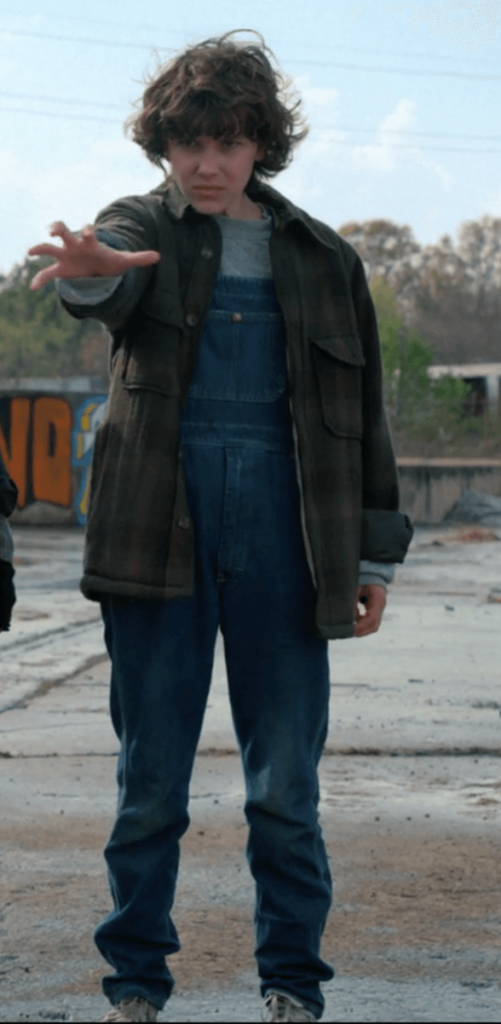
Is Thanksgiving Really a Break?
With bumper-to-bumper traffic on I-95 stretching endlessly into the horizon, last year’s Thanksgiving break was already off to a poor start. A symphony of car horns and angry New York drivers blared outside my car window, yet home was still hours away.
Once I pulled into my driveway, my jam-packed backpack slammed into the side of my car’s trunk, living proof that rest was a ways away. Instead of rushing inside to spend time with my family, I hauled my backpack to my room, plopping a mountain of books and papers onto my desk.
After spending a little time relaxing with my family, it was back to my desk, typing away at a paper that should have never been assigned. So much for a “break” from the busy semester.
With finals week fast approaching and semester burnout setting in with a vengeance, homesick freshmen and overworked upperclassmen deserve a real Thanksgiving break.
Yet every semester, a few well-meaning professors assign plenty of work over the holiday, trapping students at their desks. In fact, this especially hurts students who live far away from Rhode Island, as many have not seen their family and hometown friends since August.
Let students escape the onslaught of papers and exams for a weekend. Let them enjoy food, family, and Thanksgiving football.
-Nicholas Moran ’19
Eleven Thrives in Chapter Seven
Fans of the popular Netflix original series Stranger Things binge-watched the second season faster than you could say, “Justice for Barb.” The nine-episode arc, which was released on Oct. 27, received rave reviews from fans and critics alike. Eighties references and Steve Harrington’s hair aside, one episode is highly disputed by viewers. The episode “Chapter Seven: The Lost Sister,” explores the character of Eleven (Millie Bobby Brown) and her relationship with Kali (Linnea Berthelsen), another girl with supernatural powers.
Some critics have called the episode a “filler” as it neglects other established story lines to focus solely on Eleven and Kali. While the episode’s relationship with the rest of the season is questionable, it is important in Eleven’s development as a strong female character. The Duffer Brothers, the creators, writers, directors, and producers of the show, have defended their choice, saying it was necessary for the storyline of Eleven: “Eleven is trying to figure out where she belongs in this world…Basically, it’s her looking for a home.”
Despite significant progress, women still often have one-dimensional roles in the media. Chapter seven allows viewers to see Eleven’s dynamic nature as she shifts from a naïve “freak” to a heroine with morals, flaws, and a self- assured strength. This transformation is a great example of a female character who is not static.
Likewise, it shows how a girl can be the driving force of a compelling storyline. Additionally, the distancing of Eleven from her usual male companions helps to illustrate the point that a female character can evolve without the help of men. Although it might seem random, chapter seven shows another step in the right direction for women on television.
-Gabrielle Bianco ’21
PC Needs More Art
I am going to take us a few weeks back for a second and talk about Calabria Plaza. Do you realize that this is really the only work of art around the Providence College campus we have on display, besides religious statues?
It is time for a change. PC should be a community that celebrates all kinds of art. It is clear that we are a Dominican campus, but other art forms should be represented in some way. It is time for us to have a statue of a strong independent woman who reflects our beliefs and is on the right side of history, such as Rosa Parks.
This really could be an opportunity to express different cultures, beliefs, and values that bring our campus closer together. Beyond statues, paintings and murals are also great forms of artistic expression.
We have walls filled with black and white photos of our basketball players, hockey players, and many other sports teams. Even though this expresses our strong school spirit, there is more to life than that!
There are plenty of paintings and statues in both Harkins and Ruane, and it would be great to see this kind of art all over campus.
How about we do a mural of our current students to celebrate togetherness and community?
These are only a few ideas that could go a long way in showcasing the arts, while also celebrating Friartown. We are currently making so many changes to our campus, and I think this should be added to the agenda. Sorry to add more to your to-do list, PC.
-McKenzie Tavella ’18

